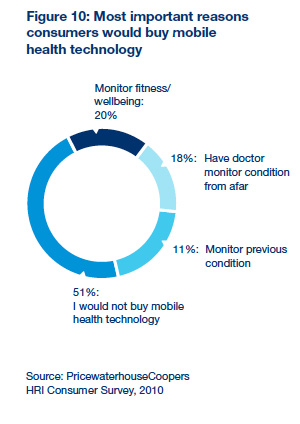 According to a new PricewaterhouseCoopers survey, about 40 percent of 2,000 consumers are willing to pay for a mobile health monitoring device like a scale, blood pressure cuff, glucose meter or heart rate monitor, but only if the price is right. The Wall Street Journal learned that of the 800 consumers that are willing to pay, 64 percent would only pay for the device if it cost less than $50. About 41 percent of the 800 consumers said they would pay a monthly data subscription fee, but 47 percent of them said that monthly fee would need to be $5 a month or less.
According to a new PricewaterhouseCoopers survey, about 40 percent of 2,000 consumers are willing to pay for a mobile health monitoring device like a scale, blood pressure cuff, glucose meter or heart rate monitor, but only if the price is right. The Wall Street Journal learned that of the 800 consumers that are willing to pay, 64 percent would only pay for the device if it cost less than $50. About 41 percent of the 800 consumers said they would pay a monthly data subscription fee, but 47 percent of them said that monthly fee would need to be $5 a month or less.
Interestingly, PwC found that most of the 2,000 consumers surveyed would prefer to buy mobile health products from hospitals or their doctors.
PricewaterhouseCoopers believes that mobile health would be of interest to most of the other healthcare stake holders, too -- as long as incentives are aligned.
"Mobile health could provide needed connections: for patients who delay care because they’re too busy to wait in a doctor’s office; for physicians who don’t have enough time to spend with patients; for device companies that want to monitor the performance of their devices; for pharmaceutical companies that want to ensure patients are taking the medicines they need; for hospitals that don’t have the capital to build more beds," PwC wrote.
According to PwC's survey of 1,000 physicians, one-third of those surveyed said they make decisions based on incomplete information and that the greatest benefit of mobile devices will be their ability to provide decision support faster and lead to better access to real-time, accurate data.
Some 40 percent of physicians surveyed by PwC said mobile health technologies, including remote monitoring, email, and texting with patients could eliminate between 11 percent and 30 percent of office visits. PwC notes that such a shift could "rewrite" physician supply and shortage forecasts for the next 10 years.
Another interesting finding in the survey was that primary care physicians are more interested in wireless ePrescribing, while specialists are more interested in accessing electronic medical records (EMRs) through their mobiles.
For more on the PwC report, read this Wall Street Journal blogpost
Read the full 30-page report from PwC here

















